- About
- Membership
- Resources
- Awards
- Events
- Get Involved


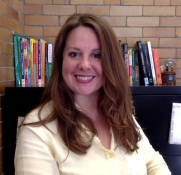
East Boston High School, East Boston, MA
I am honored to receive the 2019 Outstanding Biology Teacher Award for Massachusetts. Originally from Louisiana, I moved to Boston, MA thirteen years ago and began teaching Biology in Boston Public Schools. For the last eight years, I have taught at East Boston High School. I have been fortunate to work with such an incredible group of students, a talented team of science teachers and administrators, and partners from all over Boston who share the same dedication for life science learning. Over the past five years with the help of Massachusetts Life Sciences Center, Vertex, Amgen Biotech Experience, BioBuilder, MassBioEd, Edvestors, Boston Private Industry Council (PIC) and the CTE district team we have created a biotechnology lab and pathway that enables students to learn laboratory skills in biotechnology and molecular biology. Students in the pathway complete two courses, obtain internships in the life sciences, and receive support in selecting colleges that will help them continue their learning. Before teaching I gained experience in academic research labs at the University of Louisiana at Monroe where I obtained my B.S. in Biology and M.S. in Toxicology, and at Louisiana State Health Sciences Center where I completed my M.S. in Biochemistry. Once I began teaching, I completed my M.Ed in Science Education at the University of Massachusetts Boston.
Personal Teaching Statement - As a biology teacher in an urban setting my goal has been to help eliminate the opportunity gap by exposing my students to rigorous, authentic, and meaningful curricula and scientific experiences and connecting my students to college programs, internships, and careers in the life sciences. My hope is that my current and former students will continue to build a supportive, inclusive scientific community that continues to reach far beyond my classroom and school.
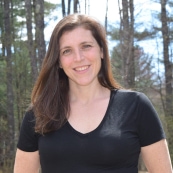
This school year will be my 12th year teaching Biology in Manchester, NH and my 11th at my alma mater Manchester High School Central. After graduating from Manchester Central, I went on to earn a BS in Physiology and Neurobiology from the University of Connecticut. I started taking classes at Rivier University just before beginning my teaching career at McLaughlin Middle School. Through Rivier I earned a M.Ed in Secondary Education. After moving to the high school level, I wanted to continue to explore the field of education and the world and that is how I found Miami University’s Global Field Program. Partaking in the Global Field Program allowed me to travel to Africa, Asia, and Central America to earn my MAT in Biology. I was able to learn from formal and informal educators as well as local conservationists and community members which gave me a whole new perspective on the world and education.
I currently teach AP Biology and Honors Biology in the same classroom where I fell in love with the subject. I try to teach students Biology through my own experiences and to learn from theirs.
Personal Teaching Statement - I have always found Biology interesting due to the constant change and progression in the field. The Human Genome Project was completed right before I graduated high school and now my students can easily extract DNA for sequencing and analysis. I have access to amazing professional development opportunities living in the greater Boston area that help me to stay up to date on the changes in the field and allow me share the changes with my students. One of the greatest values I get from these sessions, on top of the new content, is working with other amazing educators. The ability to bounce ideas off of and find solutions to problems with other teachers has greatly improved my classroom techniques and confidence. I strive to make my classroom engaging to all students and to create opportunities for each student to succeed.
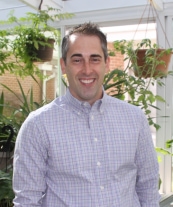
Princeton Day School, Princeton, NJ
Charles Alt is currently a member of the Princeton Day School Science Department. He instructs courses in Biology, Anatomy and Physiology, and is the current co-director of the school’s UPenn Day School Teaching Residency Program. Additionally, he oversees the school's Science Research Program (REX), and has recently pioneered an innovative STEAM immersion for 9th grade students. Prior to his arrival at Princeton Day, he was assistant STEAM coordinator and Sustainability Director at Greenwich Academy in Greenwich, CT, where he also taught Environmental Science, Ethics, and Philosophy. He holds a PhD in Philosophy of Biology and an MA in History and Philosophy of Science from Florida State University, and degrees in Biology and Philosophy from Fairfield University.
Personal Teaching Statement - “Thus, from the war of nature, from famine and death, the most exalted object of which we are capable of conceiving, namely, the production of the higher animals, directly follows. There is grandeur in this view of life, with its several powers, having been originally breathed into a few forms or into one; and that . . . from so simple a beginning endless forms most beautiful and most wonderful have been, and are being, evolved.” (Darwin, Origin of Species)
My appreciation for science education stems from sentiments similar to those expressed in the final paragraph of Darwin’s Origin of Species—that in the biological world, from war, famine, and death, we derive endless forms most beautiful. That, although red in tooth and claw, nature has managed to furnish our planet with wondrous products—cells, organs, the bombardier beetle, cordyceps fungus, and symbiotic relations of endless complexity and infinite mystery.
It is this sense of wonder that I try to bring to life in my classroom—the feeling that you are learning about the detailed workings of the self, and at the same time understanding that you are a part of something greater, that there is no such thing as life in isolation. Take for example the seeming simplicity of dung beetle horns. On the face of it, horns are for fighting, the result of male dung beetles competing for mates. But when we dig a little deeper, we uncover a story about chemistry, embryological development, and evolution. Male dung beetles that invest heavily in horn-building lose out when it comes to building wings or complex eyes—simply because nutrient allocation in these regions is diminished. As a result, larval and adolescent mortality is increased, size dimorphisms have emerged, and we have seen the emergence of “sneaky” mating strategies among small-horned beetles.
What emerges from all this, is a story about brains vs. brawn that is as true for the dung beetle as it was for David in his battle against Goliath—that sometimes it pays to be clever over being strong. Equally important is the message that it’s impossible to be good at everything—that, like the dung beetle, there are trade-offs to being good at one thing over another, and there’s no shame in admitting that we aren’t the best at everything. This, I believe is the essence of science education; making student relationships with the physical and living world a deeply personal matter. When students are able to draw connections between dung beetle horns and their inability to play the piano, we have fulfilled our job as science educators. Not only have we conveyed a highly complex biological phenomenon in a fun and user-friendly way, we have delivered a lasting experience—that even when the dung beetle horns are long forgotten (although I don’t imagine anyone should forget dung beetle horns) some kernel of a life lesson remains.
Science education is also something I believe is best served with dirty hands. I simply can’t imagine a science classroom that remains trapped inside the walls of a building. It is something that needs to be touched, tasted, and felt—and I would argue that this cannot be done entirely indoors. Fortunately, I have had ample opportunity to design courses and adapt curricula in ways that get my students outside, doing science. For example, over the past few years, I have been designing an experiential research program in Conservation Biology that involves taking students on a research expedition to the Peruvian Amazon. This program couples traditional methods with an experiential component—where students literally put themselves in the Biologist’s shoes. Throughout the course, students are encouraged to see biology through the Peruvian lens—they are exposed to key examples and research methods that will be later implemented on site. One assignment, in particular, involved assessing plant biodiversity of a nearby wooded area, using an app called Leafsnap. Students were challenged to create a 40m x 40m sample quadrat, using only string, measuring tape, the Pythagorean theorem, and wooden posts. From this, they were able to gather species data, which was then subjected to Simpson’s Diversity Index; and the result is an estimation of local plant diversity. I am especially proud of this project, not for its ability to combine disciplines, techniques, and modes of communication, but for its ability to generate smiles, laughter, and of course, data. My students were covered in dirt, insect repellent, and the occasional scrape—yet they were doing real science (and LOVING it)!
This is what I aim for as a science educator—to show students my own personal love for, and connection to the physical and living world—and encouraging them to develop and nourish their own connections, all while having fun.
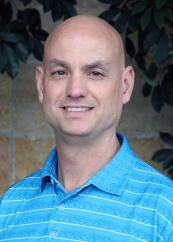
I have been teaching Biology at Hilton High School since March 1996. During, the majority of those years teaching, I have taught AP Biology and Living Environment (NY's at grade level biology). I am part of the Master Teacher Program and the Cornell Institute of Biology Teachers and have presented at numerous conferences and events including NSTA, STANYS (Science Teachers Association of NYS), NYSCATE (NYS Association for Computers and Technologies in Education) and Master Teacher Program state conferences. I am a frequent attendee at Edcamps and other attendee-led workshops and was one of the founders of CoffeeEDU Rochester.
I believe technology can significantly augment and enhance learning, but it is not a replacement for an in-person hands-on classroom experience. Likewise, students learn best when exposed to phenomena and discrepant events which force the learner to wrestle with the observed and the expected. I seek to motivate learns not through grades but instead by creating an environment that gives the students autonomy, opportunities to show mastery, and collaborative purpose. To that end, I do not give grades to my students but rely on self-assessment, peer assessment, and a lot of teacher feedback. The Next Generation Science Standards and AP Biology Curriculum Framework have allowed my students to discover and uncover Biology rather than having me cover the topics through lecture.
Personal Teaching Statement - Learning is a journey of discovery, and my teaching should not get in the way of that learning. By continually exposing students to discrepant events, phenomena, and stories make the standards accessible to students. I believe in a lecture-free Biology Classroom where the students are the doers, and the teacher is a guide. If provided enough guidance, students are better equipped to assess their learning than most give them credit. Student self-assessment with teacher feedback is a better motivator than grades.

I have a B.S. in Biology and an M.Ed. in Education from Gannon University, as well as an M.S. in Pharmacy & Pharmaceutical Sciences and a graduate certificate in Forensic Serology & DNA Analysis from the University of Florida. I currently teach AP Biology, Honors A&P, and Forensic science at McDowell High School. In addition, I have been an Adjunct Professor at Gannon University since 2011, teaching Anatomy & Physiology, Human Biology, and Molecular & Cellular Biology.
Over the years, I have developed curriculums for Biology, Forensic Science, and Anatomy & Physiology. I have been an AP Biology Reader and Writer since 2016 which led me to start an AP Biology PLC to guide other teachers in my region. I enjoy sharing my knowledge with others, helping them with lesson planning, laboratory execution, answering content questions, and finding creative new ways to teach science. I truly love what I do.
Personal Teaching Statement - I feel it is very important to provide students rigorous, but most important, relevant, lessons that not only challenge students but also create relationships between the students, the school, and the community. Education should not be about memorizing and regurgitating content. It should be about enjoying the process of learning, obtaining tangible knowledge, and applying newly learned skills to everyday life.

I am a serial graduate from George Mason University with my B.S. in Biology, M.S. in Biology with a concentration in Molecular Biology, and Ph.D. in Environmental Science and Policy. I am privileged to work at Prince William County Schools, of which I am also an alumna. My exposure to advanced STEM in Osbourn Park High School’s environmental and biological specialty program served as the foundation for my passion in science. George Mason University was the cornerstone for my cross-curricular understanding of STEM concepts and development of my research laboratory prowess, both of which I endeavor to impart to my students.
I had the honor of serving as a National Science Foundation GK-12 Fellow though which I was able to help lead a STEM summer program for rising middle schoolers with a talented group of graduate students and work with a wonderful teacher and group of students at Manassas Park Middle School during the academic year for my two year tenure in the program. I am proud to be a part of an incredible faculty with fantastic students at The Governor’s School at Innovation Park. Most importantly, my family is at the core of any successes I may achieve through their support and encouragement.
Personal Teaching Statement - Fostering a passion for STEM through deeply understanding the content in a real-life context is my goal. I strive for my students to understand how the human body works and why it has evolved to behave the way we experience. I want my students to question the world around them to figure out how we’ve gotten to the current state and where we might innovate for improvement. I hope that my students leave my class able to see the big picture while accounting for the details that drive it. I help my students communicate effectively and have enough grit to overcome any hurdles, make a real change, and achieve their goals. My students are highly capable, driven, and I aim to cultivate their passions for interdisciplinary success.
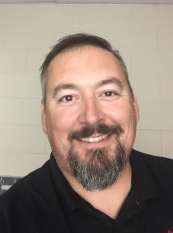
After graduation from Scottsburg High School, I earned a B.A. in Biology at IU Southeast and while working on a PhD in Neuroscience at the University of Louisville Medical School, I found that my true passion was teaching at the high school level. I enrolled in the Masters of Arts in Teaching program at the University of Louisville and was a certified high school teacher within the year.
I started teaching in 2003 at New Albany High School and in 2018 returned to my alma mater, Scottsburg High School to teach in the community I live in. I have taught Biology, AP Biology, Zoology, Marine Biology, AP Environmental Science, Health and Anatomy and Physiology. In my spare time, I work with my school’s academic teams, coaching my children’s sports teams and staying active in my church and community. I live in Scottsburg with my wife and four children.
Personal Teaching Statement - Teaching is an expression of hope for our future, a way to ensure current generations learn from the past to improve the future outlook of our planet. A major facet in being a teacher is building relationships with students, creating a rapport with them that gives them an outlet for their voice to be heard. After all, students who feel valued more readily embrace the content being taught. A public that is informed about the biological and scientific world around them is better at making local and global decisions for future generations. Seeing students make those connections drives me as a teacher.
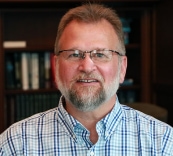
I am entering my 34th year as an educator at St. Clair High School, a public school in the metro Detroit area. I have thoroughly enjoyed teaching AP Biology, general biology, environmental science, and anatomy/physiology. I am a proud alumnus of Michigan State University (Go Green!).
I serve as an HHMI Biointeractive Ambassador, member of the College Board’s Pre-AP Biology writing team, member of the Board of Directors for the Michigan Association of Biology Teachers (MABT), and member of cohort 1 for the NABT/BSCS AP Biology Leadership Academy. I have developed and presented numerous workshops at the national, regional, state, and local levels. I am a strong supporter of co-curricular activities at SCHS. I have coached football and baseball. I am currently the director of our theatre program (85 productions) and have built an award-winning student leadership program over the past 30 years.
I have been married to my wife, Kim, for 27 years, who is an accomplished AP English Literature teacher at St. Clair High School. We are the proud parents of four children Erin, Erich, Ean, and Eamon, all who have or will be earning a degree in biology and/or environmental science.
Personal Teaching Statement - My teaching career started in 1986 with a teacher-centered classroom that featured chalkboard lectures outlined notes, book-based questions, and fortunately some exposure to inquiry and hands-on laboratory work thanks to our BSCS Green version textbook. My teaching has evolved over the years into a student-centered classroom that places me in the role of facilitator instead of expert.
In my classroom, you will see students working in groups with models, case studies, structured and guided inquiry labs, authentic data sets, or coherent storylines based on natural phenomena. Students are doing active learning, I am providing the vehicles for their discoveries.
A few of my teaching goals include: develop the science practices, able to apply these practices in new contexts, becomes a scientifically literate citizen; cultivate how to process, synthesize, evaluate, and verify the information that is now at their fingertips; foster wonder, appreciation, and inquisitiveness of the natural world they live in.
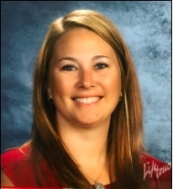
I earned my BS Biology & BS AYA Education from Heidelberg College (2006) and MEd Classroom Technology from Bowling Green University (2013). I have been teaching for 13 years, the last 10 years at Perkins High School. I work with a great crew of administrators and teachers at Perkins who have allowed me to rewrite the curriculum for the Biology and Anatomy and Physiology courses. I also designed the curriculum for our newly introduced Forensic Science course. I was privileged enough to have support to continue my education and pursue my MS Biology through Clemson University. These courses have provided me the opportunity to teach Biology and Anatomy and Physiology courses through the University of Findlay at Perkins. I also serve as an advisor for National Honor Society and BioClub. These roles have allowed me to work with a fantastic group of students. Members of our BioClub have recently been working with NASA ecological restoration efforts, and with the NOAA, Ohio Sea Grant, and OSU Stone Lab on efforts to educate community members about reducing the use of plastics and the cleanup of marine debris.
Personal Teaching Statement - My ultimate goal within my classroom is to get students to be independent thinkers who are scientifically literate. When they can analyze the data, successfully collaborate when necessary, and come up with their own conclusions, I have empowered them with the skill set necessary to continue to learn and grow within their world. By keeping my courses current, engaging, and hands-on, students are eager to learn more about the scientific world around them, and develop new ways to apply the information they have learned within my courses.

I received my Bachelor of Science and Masters in Biology degrees from the University of Wisconsin – La Crosse. As an undergraduate, I worked as a biological technician on a field crew surveying adult fishes of the Upper Mississippi River. While earning my Masters, I worked in the Ecology department at National Fishery Research Laboratory. I was inspired by one of my professors who shared that the key to making changes in environmental policies would not be a breakthrough in research, but instead educating the people of the importance of protecting the environment.
I am in my 37th year as a science educator at Logan Senior High School. I have had the opportunity to teach a variety of science courses and summer enrichment programs. I have served as a
science department chair for 34 years. I am an adjunct faculty member at UW La Crosse and teach Biology 105 to students at Logan High for college credit.
One of the most rewarding things I have done professionally was helping to develop the La Crosse Health Science Academy which serves students from nine area high schools. I am responsible for
teaching Western Technical College Anatomy and Physiology and Medical Terminology at the Academy. It has been rewarding to work with the medical professionals of the La Crosse community who
provide many job shadow, mentorship and career exploration opportunities for our students. Our Academy students have been involved with Global Partners traveling to the Pine Ridge Indian
Reservation in South Dakota working on various health science, first aid, CPR and leadership activities with Pine Ridge students. I relish the days that I receive correspondence from past
students who have gone on to higher education and are employed in the life sciences or engineering fields.
Personal Teaching Statement -Science education is the key to understanding the natural world. Our future scientists, health care providers, teachers, legislators, and voters are in our classroom. Our students will be the decision-makers that determine the direction we take in the management, use, and protection of our environment and our quality of life. I believe that all students can learn, and teachers have an incredible opportunity to make the science experience interesting, exciting and rewarding.

I grew up in Cedar Rapids, Iowa and attended John F. Kennedy High School graduating in 1974. During high school, I was a member of the cross country, wrestling, and track and field teams. After high school, I attended the University of Northern Iowa in Cedar Falls. I was undecided on a major until my sophomore year, when I decided to major in Biology. At this point I chose the teaching curriculum path, in part because I also wanted to enter the coaching field as well. I graduated from UNI and received my BA with honors. I had interviewed at several school districts and accepted a position at North Tama Community Schools for teaching 8th grade general science and 9th grade Earth Science. I also accepted the junior high wrestling coaching position. When the district decided to emphasize the integration of technology into the classroom, I became involved in the Adventures in Supercomputing program. In 1994, 1995 and 1996 I was chosen to attend the National AiS (Adventures in Supercomputing) conventions. My class placed 2nd in the Iowa AiS competition in 1997. In 1999, I accepted the Biology teaching position at North Tama. I became certified as a IOWATER volunteer water monitor and started having my Advanced Biology students monitor a nearby stream. This resulted in several awards over the ensuing years, including Outstanding Water Educator Award from Iowa State University, Conservation Teacher of the Year by the Tama County Conservation Board, The Governor's Volunteer Award for Outstanding Service, Superintendent's Award for Outstanding Service and the IOWATER Classroom of the Year. I also coached the Girls 2005 1A State Champion Cross Country team during this time. This year I received an Excellence in Science Teaching Award from the Iowa Academy of Science. It was extra special since it was presented by my sister, Dr. Mary Skopec from Iowa Lakeside Lab and the University of Iowa.
Personal Teaching Statement - I was greatly influenced in my teaching philosophy by faculty of the University of Northern Iowa. They emphasized the hands-on approach. Some of my favorite classes involved getting out in the field to carry out investigations. I learned that a field trip could involve just stepping outside of the building and looking at what is at hand. There are many others that have helped me develop as a teacher. Iowa State University Biotechnology program has been a tremendous asset to me, not only in the training that they provided in using the equipment and materials, but in incorporating the materials into a high school curriculum. The Bioethics materials have generated much classroom discussion. I have been fortunate that I have had the support of the administration and school board to try new things.
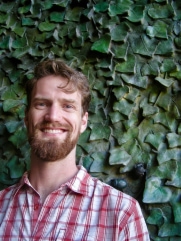
I was born in Kansas in the late 80’s and always searched the creeks and fields of Kansas for insects, reptiles, and amphibians. I decided that I wanted to be a biology teacher in 8th grade and pursued a career in education at the University of Kansas. I graduated with an BSE in 2011 for secondary biology education and then pursued a master’s degree with the University of Kansas that I completed in 2015. I have taught many classes Biology, Honors Biology, and College Biology, Zoology, Horticulture, Environmental Science and AP Environmental Science. I currently teach at Blue Valley North High School. This will be my ninth year teaching. I am a member of Kansas Association of Biology Teachers, and a fellow with Ecology Project International. My favorite part of teaching is building relationships with students.
Personal Teaching Statement - As a child I used to spend the humid Kansas summers chasing insects and reptiles that scurried in the dense undergrowth surrounding my childhood home. I would parade back in the house beaming with a smile on my face holding out snails, grasshoppers, snakes, or lizards to anyone who would notice. Sharing my love of life with those around me has always been at the core of my personal constitution. I love those moments when student’s curiosity about the natural world sparks. I believe that a deeper understanding of the natural world and our place in it helps us to engage in a richer life. That is why I teach biology.
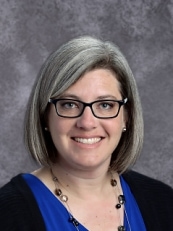
I joined the staff of Poplar Bluff High School in Poplar Bluff, Missouri in 2014. Since then, I have primarily taught biology, AP Biology, and dual credit/advanced biology. I currently serve as a District Teacher Ambassador, a Capturing Kids’ Hearts Process Champion, a committee member of the PBWrites literary initiative, and as PLC lead for the Science Department. Just prior to joining Poplar Bluff R-1 School District, I was an adjunct instructor of biology at Three Rivers College. I hold a Bachelor of Science degree in Environmental Science and a Master of Science degree in Biology. My teaching awards include 2014 Three Rivers College ACE Award: Innovative Adjunct, 2014 Three Rivers College Adjunct Teacher of the Year, and 2016 Poplar Bluff High School and Secondary Grade Span Teacher of the Year. I am grateful for the support of my family, colleagues, and administrators.
Personal Teaching Statement - I work hard to make sure my students feel welcome in my classroom so that they become prepared for what modern society requires: biological knowledge and the ability to make informed decisions that will positively affect future generations. It matters deeply to me that my students learn the facts and processes that make biology a fascinating scientific discipline. It has become increasingly important that they leave my classroom with the ability to think critically and make informed judgements, communicate professionally, inquire creatively, innovate, and treat others with respect.
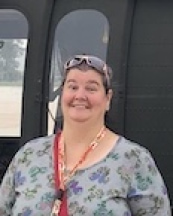
I live in Nebraska with my spouse, 3 kids, and 6 pets. I was a scientist for ten years prior to entering the teaching profession. During that time, I discovered a passion for teaching younger
people at the university I worked for. I have a Masters in Biology. I enjoy working with students, teaching them how to handle failure and general life skills, while installing a passion for
learning science. I teach both high school and college courses.
Personal Teaching Statement - Humor and failure can help learning moments stick in the minds of students. I use both to help students learn about science and life skills.
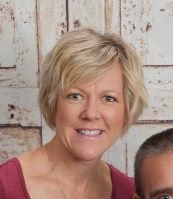
I have been a science teacher for 22 years and a biology teacher for 18 of them. I have worked in a small alternative school, the largest high school in my state and have finally settled into a nice, medium-sized school with small classes and a great community.
I received a bachelor’s degree in biology and chemistry, then continued my education to obtain teacher certification. After 5 years of teaching, I completed my master’s degree in curriculum and instruction. I continue learning by taking advantage of professional development classes to find different ways to capture and maintain my student’s interest.
Being a teacher is all about relationships and getting to know the student first. Then, I use a variety of methods and provide multiple opportunities to master content by using different types of assignments to teach the same concept. I believe this helps them reach a greater understanding and ensures their success.
Personal Teaching Statement - My philosophy of biological science education is all students should leave life science with an understanding of cellular structure and function, how all living things are connected, and how the world is being impacted by human activity. I strive for my students to understand how all living things are similar at the molecular, cellular, and organismal level. I do this by teaching how all cells, regardless of species, contain the same organelles and work the same way. Then I focus on the structure and function of DNA and how all living things have similar DNA sequences and make proteins in the same fashion using that DNA. When students understand all living things are similar structurally and functionally, they can see how the organisms are connected through evolution. This understanding eventually drives us to classification, taxonomy and finally ecology. It is my goal to provide my students with the skills and experiences to be better informed global citizens who can appreciate the complexities of the living world.
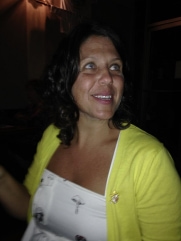
I am honored and humbled to be chosen as North Carolina's OBTA recipient. I earned a BS in Biology from Appalachian State University. My teaching career started in Transylvania County at Brevard High School in 2000. In 2006, I moved to Wake County to teach at Southeast Raleigh Magnet High School. Missing the cohesiveness and relationships of a small school district, I transferred to Chatham County in 2007 and fell in love with Northwood High School. In my time as a teacher, I have taught many different disciplines in science, but have found my niche with standard Biology and the AVID program. When I am not at school, I enjoy spending time with my amazing husband, my four-year old daughter, and my two-year old son Jack. With the free time that I have, I love spending time outside working in my garden and with my plants.
Personal Teaching Statement - I have been teaching science for 19 years. I have on average, 150 students a year, each for 18 weeks. In that time, I have the privilege to impact each of their lives. I see this as an opportunity to shape and mold them academically and individually. Teaching is a hard job. It is an emotional, physical and mental roller coaster. I would be a liar if I did not admit that I have had many moments of frustration, doubt, anger, and utter tears. It is so easy to be consumed by these things and forget the reason why I teach. I love my students. I love teaching my students about science. I love it when they get excited about what they are learning and say, “That’s cool!”, “Today was fun.” and “Class is already over?”. I love building their confidence. I love their respect and comfort in my classroom. I love that they do not want to disappoint me. I love it when I can make them laugh and when they make me laugh. I love watching them grow up and eventually walk across the stage at graduation. I love the fact that the teacher I am today is because of them.

I have been teaching biology for 9 years, the last five years have been at Spring Hill High School, a career pathways magnet school. I earned my Master’s degree in the art of teaching in secondary science education from Piedmont College and a Bachelor’s degree in Food Science and Engineering from the University of Georgia. This year, I was recognized as a National Board Certified Teacher and was also honored as the American Legion Teacher of the Year from Chapin Post 193. This summer I published an article on National Board's online blog, The Standard. I have served for three years as a coaching teacher with the University of South Carolina's Education program.
Personal Teaching Statement - I believe each child is unique and that each deserves and desires an atmosphere to become well-rounded individuals. I believe it is the school’s purpose to facilitate each child in reaching his or her own potential and to encourage each child on his or her way to becoming that well-rounded individual. Furthermore, I realize it is the duty of the school to foster future, responsible citizens who accept responsibility for their actions and understand their influential impact in a community.
My pedagogy is founded in purpose. During my tenure and teaching experiences, I have come to firmly believe that purpose is the root of successful and effective teaching. In my experiences in high school and alternative school settings, I have learned that everything begins with purpose. The students establish a relationship with a teacher based on the teacher’s purpose for being in their classroom. The education process begins with purpose; students constantly question the purpose of content material and learning objectives. Finally, the educational experience ends with purpose; students and teacher alike must reflect on the purpose of what he or she has learned and how to transfer learning to real world applications. The purpose of biological sciences as an area of study in secondary education is to cultivate self-directed learners through the use of inquiry-based instruction to meet state and national standards. Science teachers have the unique opportunity to engage students through various and differing methods that spark the interest of each student; therefore supporting further self-learning.
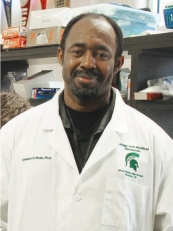
I got my BS in Biochemistry from the University of Uyo, Nigeria; an MEd in Curriculum and Instruction from Freed Hardeman University, Henderson TN; and a PhD in Biomedical Science (Cancer Genetics) from the University of Tennessee Health Science Center in Memphis. I started my teaching career in 1996 and have taught a wide range of subjects and grades in two continents. I also did research for some years and taught college-level classes. Currently, I teach AP Biology, DE Biology, and DE Anatomy & Physiology at White Station High School in Memphis and teach as work as an adjunct lecturer at the University of Memphis.
The passion for teaching was sparked in me by my high school economics teacher and etched deeper when I took up some part-time jobs as a tutor after high school and while in college. During those times, I enjoyed the challenge of trying to simplify complex concepts for my “students” to appreciate - an exercise I still find absolutely thrilling! When I’m not teaching, I enjoy working out, volunteering, reading, watching law shows on TV, and spending time with my family.
Personal Teaching Statement - As a teacher, I strive to make the gap between high school and graduate research narrower - especially for minorities (gender, race, and socioeconomic). To that end, I collaborate with universities, research institutions, and companies all over the country and in other countries to expose my students to broad science opportunities before they graduate. I strive yearly to train my students to be independent searchers and motivated learners. It is for these outcomes that I teach, such that students are inspired to value their sense of curiosity, of persistence, and of success.

William ”Bill” Dorsey teaches biology at Capital High School in Charleston, WV. He received his Bachelor of Science in Zoology and his Master of Arts in Teaching from Marshall University. He earned his National Board Certification in 2013. He serves his school as Faculty Senate President, as a Professional Learning Community Facilitator, and as the Quiz Bowl Team coach. Mr. Dorsey is an AP Exam Reader. He has served Kanawha County Schools on the Science Textbook Adoption Committee and helped create pacing guides to align biology courses with the WV Next Generation Science Standards. He has designed virtual biology courses for Kanawha County Schools and facilitates those courses for the WV Department of Education. Mr. Dorsey mentors the Health Science and Technology Academy (HSTA), an afterschool program affording underrepresented students in-state college tuition waivers. He is as an adjunct at Bridgevalley Community and Technical College, teaching biology classes at night.
Personal Teaching Statement - A lifelong learner himself, Mr. Dorsey hopes to instill in his students a desire for continuous learning through an appreciation for the natural world and their place within it. Just as life continually adapts and evolves, Mr. Dorsey works to find new educational approaches in hopes of broadening his ability to reach each and every student. With a classroom motto of “find a way, not a reason,” Mr. Dorsey hopes to help his students learn that they are capable of succeeding, despite any obstacles.
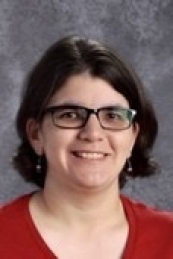
I've earned three degrees from the University of Georgia – B.S.E.D. in Science education, B.S. in Biology, and M.S.E.D. in Science education. My teaching career began at Monroe Area High School in 2005 and a few years later I started at North Oconee High School. In my fourteen years of teaching, I've taught a Biology course (general, honors, or AP) for the majority of those years. This school year will be my eleventh year teaching AP Biology. After a few years of teaching AP Biology, I applied to be an AP Reader and this summer was my fifth AP Reading. For five years, I've coordinated an in-school mentoring program to help students make a successful transition from middle to high school. I've also served on our school's RTI or MTSS committee to help current students who may be struggling in their coursework during the academic year or semester.
Personal Teaching Statement - I've always wanted to be a teacher! At a young age, I fell in love with science. The ways you could explain the world around you through science amazed me. In the science courses I took at the University of Georgia, I always approached each course with a question, “How can I teach this to students?” I did my best to take the content and look at it through the eyes of high school students – what would they focus on, comprehend, and how could I take that concept and help them understand it. I want my students to be better citizens of the world and see the science all around them. I've taught my students that the best way to learn is to teach the content to others. Through both items, I'm presenting my passion of science to students in the hopes that they will enjoy the class.
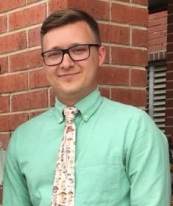
I live in Abbeville, LA with my wife, who is a middle school English teacher, and my two sons, Luke and Hugo, who are 5 and 3 years old. I have a B.S. in Secondary Biology Ed., a M.S. in General Biology, and am currently working on an Ed.D. in Curriculum Leadership. I have taught Biology, A &P, Environmental Science, and DE Biology for 10 years. I am also a Teacher Ambassador for the National Center for Science Education and the Teacher Institute for Evolutionary Science for which I present PD workshops and conferences. I started and sponsor a Science Club in my district and am the teacher leader of the Area Health Education Center for Vermilion Parish.
Personal Teaching Statement - Throughout my career, I have found collaborating with other teachers to be the most rewarding professional experience. My passion is for constructing curricula and working with other teachers to figure out ways to engage students with content and help them build bridges of understanding for their students. I believe that science can be a powerful tool, not only for understanding our universe, but also for liberating people from oppression. As teachers, it is our responsibility to help our students understand both the science and how the science can be used to liberate themselves and make the world better for all members of society.
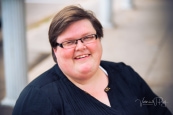
I have been teaching for 16 years. I have taught every science class from physics and chemistry to foundations of biology. I also teach dual enrollment classes for the local college. My most favorite class to teach is Human Anatomy and Physiology. I have my Master of Science in Natural science. I love my students and try to come up with inventive ways to teach different concepts. I feel that if you love what you teach then you will pass on the love of that subject to your kids. I am a member of MSTA and MSABE. I am also a member of the Physics teacher’s organization in Mississippi.
Personal Teaching Statement - I believe that all students can learn and that for some it just takes teaching it in a little bit different way to get it across to them. I am always looking for new ways to teach the content for those that can not get it any other way. My big MOTO in my district is "All students can learn no matter their ability."
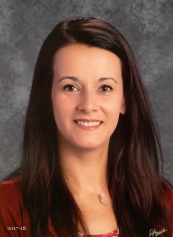
This fall will start my 18th year of teaching. I teach biology and anatomy and physiology at Fayetteville High School. Both my Bachelor’s and Master’s degrees are in Agriculture Education. I taught agricultural science for one year and was then offered a teaching and research assistantship at the University of Arkansas. Upon graduation, I took a job teaching science at Fort Smith Northside and served as department chair. I had four students’ projects qualify for International Science Fair. I became certified to teach ESL in 2007 and achieved National Board Certification in 2008. After taking a job at Fayetteville High School, I began forming partnerships with professors at the university. This resulted in workshops for students interested in molecular biology and a published article in the Journal of Biochemistry and Molecular Biology Education. This next school year will find me working on becoming a National Geographic certified educator.
Personal Teaching Statement - I am a firm believer in telling students what to look for without telling them what to see. I use the word “science” as a verb and tell my students that in my class we will be “sciencing”. The deepest level of learning, and retention for that matter, occurs when students are able to explore science in an autonomous way that allows them to conceptualize the curriculum. I have written grants to start and grow a science library and focus on developing my students’ science literacy. I rely on the science library to engage students in science talks. I have found that technical topics in science needlessly intimidate many people, and thus open dialog about science is hard to start and maintain. The solutions to contemporary issues facing our communities, nation, and planet desperately need open science dialog. I want my students to be able to discuss such topics with intelligence and comfort.
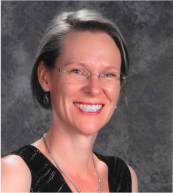
Stephanie Mitchell has been teaching at Los Alamos High School for fourteen years. She has taught all levels of physics and biology. She earned her Master’s degree in science teaching from New Mexico Tech and her Bachelor’s degree in engineering physics from the University of Colorado. In addition to teaching, she is an active member of the New Mexico Teacher Leader Network, has created NGSS aligned lesson plans for statewide publications, and participated in the New Mexico Instructional Material Review Committee to choose NGSS aligned textbooks for the state.
Personal Teaching Statement - Learning occurs when we feel welcome, are curious, and have opportunities to engage and make mistakes. I want my students to be as excited about science as I am. I want them to be successful in life and I believe part of that success involves learning and understanding the world around us. When I was in high school, I read Dale Carnegie’s book How to Win Friends and Influence People. The best teachers unconsciously follow Carnegie’s rules. I am genuinely interested in my students. I learn all my students’ names within the first week of school, greet them at the door, and call on them by name during class discussions. I smile a lot. I focus my classroom discussions around my students’ interests. By following these rules, my students feel welcome in my classroom and look forward to my class.
I recently asked my students if they thought they were more curious about the world when they were in elementary or high school. The majority answered elementary school. Isn’t that sad? I told them that we were going to work on that this year. They were going to learn to ask questions again like when they were young. I love how NGSS is structured to show students phenomena and to get them asking questions that we can use to build our lessons. Can we really live our lives fully if we are afraid to make mistakes? A willingness to take risks in the classroom is the only way to be fully engaged. I encourage students to answer questions even if they are unsure of the answer. A wrong answer, I often tell them, can be the best starting point for a good discussion because people often share the same misconceptions.
My students may not become biologists, but it is my goal that they appreciate our natural world, rekindle their curiosity, and engage in life fully. I also hope they remember me as someone who cared about them personally.
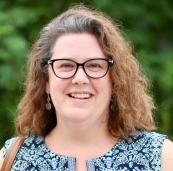
I have always been a student of science--my earliest memories are of hours spent observing insects underneath the bottlebrush tree in my backyard. By the time I began my freshman year at Grinnell College, there was no doubt I would major in biology! At Grinnell I was most inspired by my coursework in evolutionary biology, which led me to Washington University where I completed my Ph.D. on the evolution of troglobitic planthoppers in the Hawaiian lava tubes. Throughout my years as a student, I always knew I wanted to teach. While I initially thought I would teach college, my teaching assistantships changed my path. I discovered that collegiate biology classes were full of students who had already decided they loved science. I found myself wondering about the students who decided before college that they did not like science. Could their minds be changed by teachers who believed in them?
After graduate school and a few years to start a family, life led me to my first (and only!) teaching position at Holland Hall, in Tulsa, Oklahoma. I am enormously grateful to spend my days with young people, colleagues and administrators who both challenge and support me. My practice has been greatly enriched through collaborations with and professional learning from organizations such as HHMI’s BioInteractive and the Center for BioMolecular Modeling. Over the past few years, I have greatly enjoyed sharing the resources I have gained from these collaborations with the dedicated and talented biology teachers of Oklahoma and beyond.
Personal Teaching Statement - Even as a young student, I was aware that the teachers who led by their hearts had the greatest influence on me. Mr. Hanks hustled daily to curate a biology classroom full of excitement and wonder. Mrs. Langabee taught me a lot about physics, but more importantly at that time in my life, she took care of me as my mother was dying. Throughout college and graduate school, my most influential mentors invited students into their lives and passions, not just into their labs and classrooms. Thus, I’ve always been acutely aware that I became a scientist because of teachers who not only believed in me, they gave freely of their hearts.
As an educator, I now give what I received from so many along life’s way. Of course I teach with the intellectual passion and curiosity I have for the dynamic science of Biology. However as I was taught, I teach with my heart. First and foremost, my classroom must be a place where all students feel safe and valued. My pedagogy is flexible, centered around the needs of my students. I am a coach, a trusted adult, an enthusiastic cheerleader, an open-minded lifelong learner, and a curator of an environment that is safe for intellectual risk-taking. I try to challenge students to individually dig deeper than they thought they could, to learn when to struggle and when to ask for help, and to allow themselves to ask questions and seek answers so their curiosity can shape their learning. I try to encourage metacognitive approaches so students can become masters of their own strengths and learn to identify (and improve) their weaknesses. Throughout it all, I show my vulnerabilities and laugh at my numerous mistakes, hoping my students will be comfortable doing the same. But most importantly, I listen, and I let them all know they are loved and valued. Giving of my heart to future scientists and citizens with whom I share my classroom is the greatest gift of hope I can give to the future.
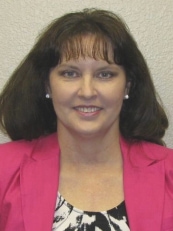
I attended Texas Christian University for my bachelor's degree and Texas Woman's University for my master's degree. I have been teaching high school biology for 31 years. I started teaching in a small school where, along with one other teacher, we were the science department. I started the AP biology program at Colleyville Heritage High School and solely headed that program for 21 years. Currently, I teach AP biology at Hebron High School and have for the past 3 years. In addition, I have taught biology at the University of Texas at Arlington in a program for teachers who were working on their master's degrees, and currently teach majors biology at Tarrant County College where I have been continually working since 2013. I have led workshops at CAST and mini-CAST, was a TEXteams trainer, and have done AP biology exam prep sessions for other districts. I try to stay involved in current advances in science education and model lifelong learning.
Personal Teaching Statement - Biology has always been my passion. Each new school year I am excited to share this passion with my students. I believe the job we do as science educators is very important. Getting future science majors to share the passion is very rewarding. I enjoy preparing students for future science education/careers, and developing understanding in natural phenomena in all students. My goal each year is to ignite that natural curiosity and love of learning that is basic in all of us by finding new and interesting methods to introduce and work through information using inquiry rather than just passive learning, as well as helping students take ownership in their own learning.
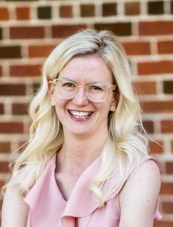
I teach Biology at Belgrade High School in Belgrade, Montana. I primarily teach students that struggle with math and reading and/or receive special education services. In 2013, I earned a B.A. in Biology, Biology and Chemistry for Secondary Education, minor: Chemistry from Carroll College (Helena, MT). In 2017 I earned a Master’s of Science in Science Education from Montana State University. I am currently attending Texas Tech University to earn a PhD in STEM Curriculum and Instruction.
In 2016 I was the recipient of the Stacia L. Micheletto, MD, Early Excellence in Science Teaching award. I also have been the recipient of four Class Act Awards, awarded by Sylvan Learning Center and Beartooth NBC. Through the M.J. Murdock Partners in Science Program I have conducted molecular biology research on tripartite motif (TRIM) proteins, an understudied family of antiviral proteins and presented my research at the national conference in 2018.
Personal Teaching Statement - My goal as a Biology teacher is to fully integrate my roles of teaching Biology, being a teacher-researcher, and a Biology-researcher within my classroom (and get my PhD). Ultimately, I do not want to impact just the students within my classroom walls. I want to facilitate student growth within the Life Sciences in my district and state, and why not reach for that national and global level as well, but first, baby steps. I am starting project/problem-based global learning in my classroom this year and I am very excited to experience these firsts alongside my students.
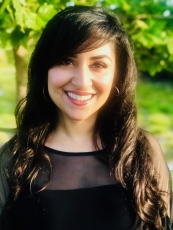
I am honored to represent California as the recipient of the OBTA. This will be my thirteenth year teaching Biology, and my fifth year teaching at Sonora High School in La Habra. I currently teach AP Biology and Anatomy and Physiology. I earned my Bachelor’s Degree from Cal Poly Pomona in Animal Science/Biology and my Masters in Education from Claremont Graduate University.
In my classroom, students embrace inquiry-based science lessons and hands-on labs which make them feel vested in their learning because they are the ones asking the questions, investigating and seeking the answers. Exploring Biology outside of the classroom has provided me with an avenue to create special bonds with my students. I love to travel and feel compelled to share this passion with them. Every summer, a group of my students travel with me on an ecology field trip. So far, we have been to Iceland to study glacial decline and Costa Rica to study how bats impact the rain forest.
Personal Teaching Statement - Just as much as it is the parent or guardians’ job to provide basic needs for our students, I see it as my job as the guardian of my students’ education: When they are in my classroom, their need to learn is met. I try not to let a day go by where I don’t check for an understanding of new concepts attained in my courses. I make it my priority to encourage growth and learning in a way that students can leave their prior misconceptions at the door: I let them share with me their fears and roadblocks, I respect their individual journeys, and I gently push them to achieve and feel successful in science.
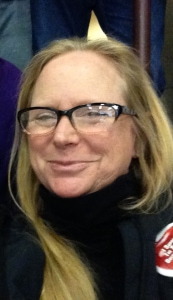
I first started teaching in in 1984. I wrote and won a Job Training Partnership Act grant to teach, re-train, and develop job skills to adult learners in office automation hardware and software. The grant ran for two years and successfully served over 150 learners. I also taught at the college level throughout the 1980s and in 1989 moved to Oregon. Always teaching at the college level, I went back to graduate school in 2004 and got a degree in Teaching and obtained my Oregon Teaching license. I live in a small rural community and teach AP and honors biology, advanced human anatomy and physiology at the high school level. I also continue to teach at the local community college.
Through participation in the HHMI Science Ambassador Program and working with the BSCS/HHMI/NABT Biology Leadership Teacher Academy (first as a participant in 2012, then as a PD provider in 2015-2019), I’ve had the ability to participate and provide instruction into good practices and pedagogy for biology teachers. This work, and working for the Oregon Department of Education as a NGSS Science Advisory panel member, allows me to pay it back and forward to other educators and to future science learners in Oregon. In this way, I can participate in serving the teaching community. I also serve the teaching community as the President of my local Association (union). To support, protect, advocate and promote individual teachers and the teaching profession is a great honor and I’m proud every day to serve in this capacity.
Personal Teaching Statement - Teachers help build the next generation of citizens who are scientifically literate in the democracy. That’s the goal in the nation and the push from Science for All Americans, the AAAS strategic plan to get Americans to scientific, mathematics, and technological literacy by 2061. I used that document, the Atlas of Scientific Literacy, the Benchmarks for Science Literacy, and other documents via the U.S. Department of Education, the National Science Foundation, NASA, and NOAA, and others to build my first vision of what that could look like in my own classroom. That was during my first five years as a biology teacher. That seems like the right thing to say here to begin. I could see that individual teachers could be agents or catalysts of change to build a better system based on inquiry, critical analysis, and good pedagogy. We can help facilitate the change of perspective in the generations of students we encounter.
In order to implement that philosophy, I am intentional about building of classroom culture based on relationship. This is a collaborative effort where students are involved in creating the expectations. This brings investment into the space and the group. This starts on day 1 and continues until the last day of school. This models and encourages inclusion, team partnerships, mutual acceptance, and forgiveness. Students are given permission to make mistakes, I work hard to helping students feel physically and emotional safety while challenging them to go beyond their comfort zones. We also spend time celebrating (all sorts of things) as well as being intentional and joyful. In order for students to feel valued, trusted, and safe they become partners (with me and with their classmates) in their learning process. We make journeys into learning material, processes, and practices. I am also intentional about the why of what we are learning providing well-defined targets. And then, I ask for just a little bit more.
My goal is always to differentiate for the individual learner. This is challenging in a system where we encounter 150+ students each year. In doing so, I work on finding interests, and getting the challenge level just right. To model collaboration and cooperation to get understanding permits some chaos. I have learned to live in that spot while a learner makes their way to understanding. It’s messy and takes time. We have to be patient to watch that bloom, intervening when the moment is right and in places where an individual learner.

The National Association of Biology Teachers empowers educators to provide the best possible biology and life science education for all students.
NABT, P.O. Box 335, Heber City, UT 84032
office@nabt.org | Fax: (202) 962-3939
(888) 501-NABT or (703) 264-9696
Thank you for visiting the NABT website.
Our privacy policy is found here.
Announcements for products or services on this website do not imply endorsement of or by NABT.
Website by Morweb.org
Copyright National Association of Biology Teachers
